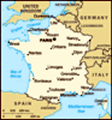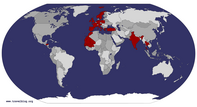Advertisement
Published: February 1st 2007
A typical day in this atypical 2006/2007 winter: sunny and 15 degrees of temperature. Marseille railway station is a ferment of hectic human activities. Masses of workers move towards city centre in the morning, recoiling then in the evening, same number, opposite direction. It would be like the sea and its two daily tides if only the latter would rest on week-ends. But today it’s week day and therefore there are the workers, there are the occasional travellers like myself, there is the police aligned in great number and there are those ever present members of the human underbrush who, gulls around a fishing boat alike, do not miss a chance to collect the fruits of other’s distraction.
Back in the Hostel I had met Suzanne, a blond and well rounded Dutch girl who, with wooden sandals and a couple of small locks, could very well be chosen to be Netherland’s flag carrier in the next folklore’s Olympic. She’s heading to Spain and so am I, hence we decided to make part of the journey together. We seat on the staircase of one of the station’s way out while waiting for our train to Toulouse, eating bread and cheese and
talking about alternative lifestyles. I think she was saying something about “firmly believing in the positive nature of mankind” when one of these beings equipped with positive nature steals her handbag. The scene develops in such a short time to appear nearly unreal. A young Moroccan (or Algerian, or Tunisian, a North African anyway) passes next to us, harpoons Susan’s bag and starts running towards the base of the staircase. Susanne sees it from the corner of her eye, jumps up at once, as quick as if she had been tipped by a tarantula, grabs the bag from the other side and yells something in Dutch (a hymn to the positive nature of mankind, I suppose) to the overwhelmed pickpocket who, unprepared, hesitates a moment between pride and fear, but finally loose his grip and release the bag. He first looked at us with a scared cub expression, like asking “please, don’t tell my mum”, then, once far enough not to receive a punch on his snout (or a Dutch sandal on his head) and made sure his buddies are nearer that the closest police officer, he turns towards me opening his arms in rapper style, as to say “yo,
yo, yo, I fear nothing, yo, yo, yo”. Apart from a Dutch sandal on his head, that is.
Marseille has been my fourth stop after Roma, Pisa and Nice. As soon as I arrived, I looked for the youth hostel and I must confess that after many years of travelling and hostelling I still don’t exactly know why I’m so obstinate in making unconditioned use of them. Generally speaking, HI hostels are characterized -modest prices apart- for their unfortunate location. I mean, they are called youth hostel, that is, it caters for people who, 9 times out of 10, arrive by train. But, if the train station lies, say, in the west area of the city and most of the historical points of interest are in the northern area, the hostel will be found in the south-east, purely math, not even need to ask for it. To compensate, is the kind of place one always meet interesting persons like the already cited Susanne. Or like Paolo, a political sciences student from Tuscany who I accompanied once down to the old city in his quest for… curative herbs.
Marseille’s old city wholly retains that mercantile and genuinely Mediterranean flavour
that in very few places (Naples, for example) still survives nowadays. In the narrow alleys that come down to the port still find place grocery vendors to the minute, bazaar with Middle Eastern essence and that bargaining kind of business with a soul that reminds us we are persons, not just cows waiting to be milked. Here, where a mega-hiper-maxi-Carrefour would have problems because of lack of mega-iper-maxi-parking lots, the police isn’t present at all. If there is no owner there is no private property and if there is no property there is no guard dog. And, anyway, at the station there were policemen by the hundreds and none of them took notice of the theft attempt. It is here that, elbow to elbow with legal transactions, drug dealing (the one on small scale) is carried ahead.
Paolo, enlightened, seems to have a brilliant plan in order to find what he is looking for: “we take a stroll and as soon as we see a thug looking guy we approach him”. Now, Marseille’s port area is not exactly renowned for its high concentration of devout souls and to search for a “thug looking guy” here is like searching for
someone with a tattoo in a jail. And in fact, two minutes times and were the vendors who approached us. Paolo concluded his good purchase and from there we returned to the hostel (to the other end of the city, let’s remind it) to end the day on good red french wine. For the record, I’ve discovered in the municipal museum that the ancient inhabitants of Provence used to import wine from the Etruria (roughly, nowadays Tuscany) and that were the Romans that leaded the way in France to the previously disowned cultivation of grapes. Another world-cup for us :-)
Next stop: Carcassone. A whole middle-age citadel encircled by a double belt of town-walls. Cobblestoned narrow lanes, no wider than a chariot (that was the way road width was settled during middle-age), an entire castle built against one of the town-walls side and a cathedral, then retreated to the rank of simple church, then risen again to the basilica rank. The lot conserved in impeccable way. The first town-walls of fortification, the castle and the basilica were built by Viscounts of Trencavel between XI and XII centuries, when these were the lords of the region, alternatively allied of Barcelona
or Toulouse according to circumstances. During the crusade against Catharism, Carcassone became a Cathar stronghold till its fall in year 1209. To this period belongs the building of the second town-walls, under orders of the king of France, now new masterof the region. Carcassone, by now considered impregnable, it had become a border town between France and Aragon. The strategic importance of the city remained unchanged during years, until 1659 when, according to the Treaty of the Pyrenees, the Hispanic-French border line was moved further south, near the actual one, rendering therefore superfluous such a stronghold. In the XIX century the citadel was in piteous conditions and the military authorities were quite considering the idea to demolish it and only thanks to the interest of architect Eugene Viollet the Duc and to the sponsorship of emperor Napoleon III the buildings were saved and restored. Monsieur Viollet and his disciples (Viollet died in 1879) have been accused from more parts to have executed a restoration not too faithful to what the city should have originally looked like. I personally do not know if that corresponds to truth, but I believe that a great job of historical reconstruction has been carried on
and that the visitor identification process with what life had to be like in those days it is by far easier in these conditions rather than facing a cumulus of more faithful ruins.
In Narbonne I had parted from my the occasional and fearless travel companion, it’s a shame because a bodyguard seems to come well handy these days. Yet, more than a bodyguard I’d need an interpreter. Every time I set foot in France I understand that if had spent three years leaping from liana to liana in the Cameroon jungle instead of studying french, today I would not own worse linguistic proficiency of what I’ve actually got. It’s frustrating to enter a boulangerie and be forced to order what is easier to pronounce rather than what you would actually like to eat. Beside, apparently suffering from inferiority complexes, I have the tendency, every time I visit a Country of which I possess some minimal idiomatic acquaintances, to prepare in advance phrases so to pronounce them correctly and with reasonable detail of vocabulary. This always ends up like a boomerang throwing. Example: a foreigner enters your store and asks for “kilo for the well bread” you will be moved -if not to make the Sioux greeting sign- to answer in a simple way, like “yes”, “ok” or other similar and unmistakable monosyllables. Opposite case: a foreigner (but you can’t know he is foreign because he hasn’t opened his mouth yet) enters your store and says “good day to everyone, a bit chilly today, isn’t it? Madame, please, would you kindly give me a kilo of that wonderful and tasty white bread?” you -local- will be forced to answer in an equally detailed way and here is where I do not understand what I’m being told, my bluff uncovered, I blush, I use my index finger to spot what I want to buy before disappearing not to be seen again.
Advertisement
Tot: 0.057s; Tpl: 0.011s; cc: 12; qc: 28; dbt: 0.0269s; 1; m:domysql w:travelblog (10.17.0.13); sld: 1;
; mem: 1.1mb














olivier
non-member comment
sala malecum
hello, Marco i just loved your story about france; did you try to play petanque and drink pastis in marseille? if not you missed an important part of the local culture!!! i'm now in sénégal where we met the first time, i will stay one or two years in sokone close to the border with gambia. wher is your next stop? hope to see you in sénégal soon. take care olivier